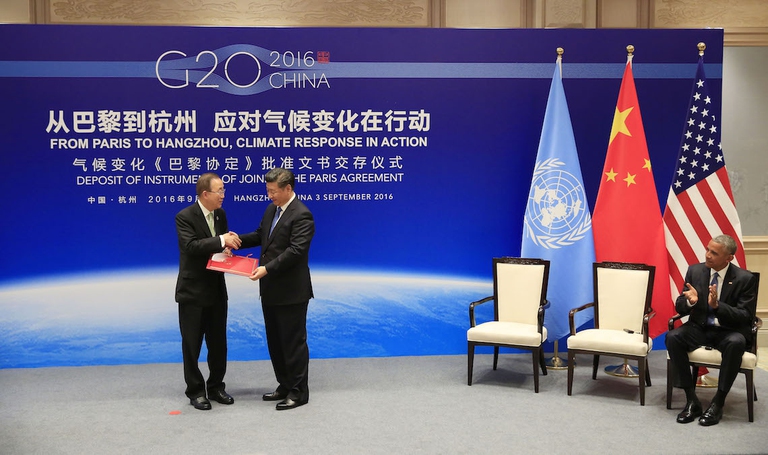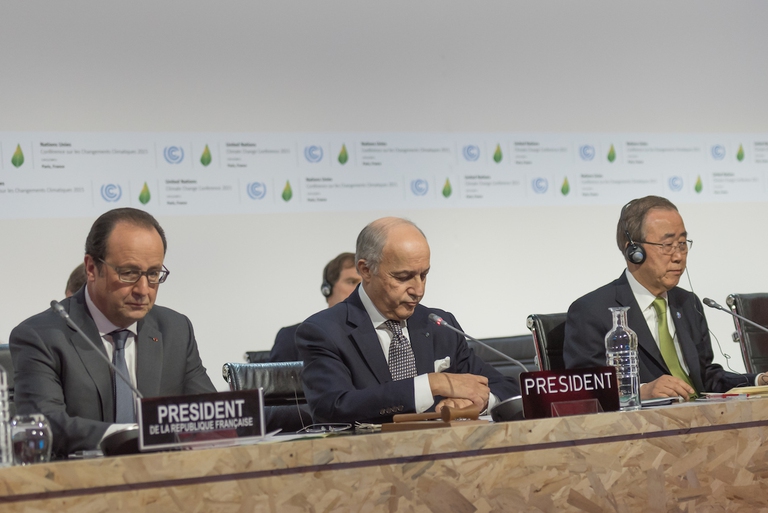
The 26th edition of the United Nations Climate Change Conference, COP26, will be held in Glasgow, Scotland in November 2020. The pre-COP will take place in Milan, Italy.
Le due nazioni hanno consegnato alle Nazioni Unite i documenti per la ratifica dell’Accordo di Parigi. Che, tuttavia, non può ancora entrare in vigore.
US President Barack Obama and Chinese President Xi Jinping have submitted their plan to ratify the Paris Agreement. The deal was reached in Paris in December as a result of the 21st UN climate change conference (COP21).
The ratification represents a pivotal achievement, considered that the United States and China are the world’s largest emitters of greenhouse gases. Plus, the fact that they handed their plans to UN Secretary-General Ban Ki-moon is a solid step for the procedure for the deal’s entry into force.
For the Paris Agreement to come into force, at least 55 countries must join, provided that they represent at least 55 per cent of global emissions. According to the United Nations Framework Convention on Climate Change (UNFCCC), 26 countries have ratified so far including the US and China, accounting for a total of 39 per cent of global emissions. Many other nations (180), though, have only signed the agreement, without ratifying it.
195 countries took part in COP21 and only a few of them haven’t signed or ratified the agreement yet. With its entry into force, the deal would commit the countries to try to keep temperatures below 1.5°C above pre-industrial levels.
However, the pledges made by countries so far seem to be not enough to meet the goal. In fact, according to data provided by the French government, 2.7°C will be reached if countries won’t commit further. COP22 will be held in Marrakech, Morocco, in early November, and each country must understand the need of implementing more steps compared to those taken so far.
Siamo anche su WhatsApp. Segui il canale ufficiale LifeGate per restare aggiornata, aggiornato sulle ultime notizie e sulle nostre attività.
![]()
Quest'opera è distribuita con Licenza Creative Commons Attribuzione - Non commerciale - Non opere derivate 4.0 Internazionale.
The 26th edition of the United Nations Climate Change Conference, COP26, will be held in Glasgow, Scotland in November 2020. The pre-COP will take place in Milan, Italy.
Thanks to activists, the voice of the world’s peoples resounded through the COP25 like an alarm bell. Governments didn’t reach the results they demanded, but their cries and messages were stronger than ever, reaching even those who weren’t in Madrid.
Climate change poses a risk for millions. However, women are the most vulnerable to its negative consequences: a few simple considerations by the Italian Climate Network help us perceive the global implications of this.
The COP25 ended two days late and with very few steps ahead made. Climate negotiations in 2020 will be an uphill battle as political will clearly seems to be lacking, once again.
The last ten years have been the most “exceptional” and hottest decade ever, with extreme weather hitting people and ecosystems harder and more frequently. 2019 is also on course to becoming the second or third hottest year since records began.
Unite Behind the Science: this was the title of the conference held at the COP25 on 10 December. Greta Thunberg’s presence filled the arena, but this time it was scientists’ turn to speak.
25,000 delegates meet for the COP25 from 2 to 13 December. What can we hope this UN climate change conference, whose venue was changed from Santiago de Chile to Madrid, will achieve?
100 eminent people from all over the world, including Vandana Shiva, Naomi Klein and Noam Chomsky, have signed an open letter after the disappointing results of the COP24. A call-to-arms for climate against world leaders’ indifference.
The outcome of the COP24 in Katowice left many unsatisfied. Greta Thunberg, a young Swedish environmental activist, gave a harsh, heartfelt speech addressing world leaders.









